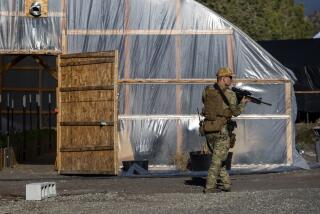Tobacco Farmers Grow Something Harmful, so Sympathy for Them Seems Misplaced
- Share via
The government’s rush to protect those who produce a substance that has no known benefit and kills millions of people all over the world every year astonishes me [“Tobacco Growers Appeal for Protection,” Sept. 19].
Yet President Clinton says that tobacco farmers are “good, hard-working, tax-paying citizens and they have not caused this problem. . . . We cannot let them, their families or their communities just be crippled or broken by this.” I am sorry that it will be painful, as Clinton noted, for growers to switch from their lucrative crop to something that pays far less.
But I cannot get out of my mind the sight of my mother’s painful early death from smoking, or of my beloved aunt’s excruciating lung cancer surgery, a result of breathing secondhand smoke, or of my 25-year-old niece who died in a fire from falling asleep with a cigarette in her hand. The pain that tobacco caused them and the pain of those of us who loved them and are left with only memories far exceeds the pain of switching to a less lucrative crop, I believe.
What is different from a farmer who says “I was born to a tobacco farmer. I do not like being condemned because I was not born to a rice farmer or wheat grower” and one who says “I was born to a coca grower and I do not like being condemned because I was not born to a tobacco farmer”?
Tobacco kills more people than cocaine, heroin, alcohol, murder, suicide, fire, auto accidents and AIDS combined. It’s illegal to produce coca or opium.
Shouldn’t it also be illegal to produce tobacco, considering what we now know about it? I will never understand how our government can warn us of the dangers of smoking while still subsidizing and protecting the producers of this deadly poison. After all, haven’t the tobacco growers known for at least three decades that they were killing millions of people with their crop? Wasn’t that enough time for them to find another, more ethical, humane way to make a living? Wouldn’t money from a tobacco settlement be better spent caring for those who have been hurt by tobacco than those who have produced it?
Perhaps I am naive but it seems to me that something is gravely wrong with this picture.
MARY EMBREE
Ventura
More to Read
Sign up for Essential California
The most important California stories and recommendations in your inbox every morning.
You may occasionally receive promotional content from the Los Angeles Times.













